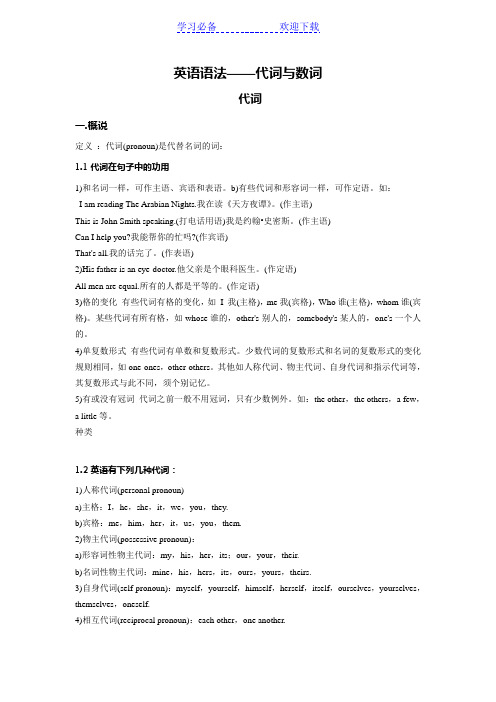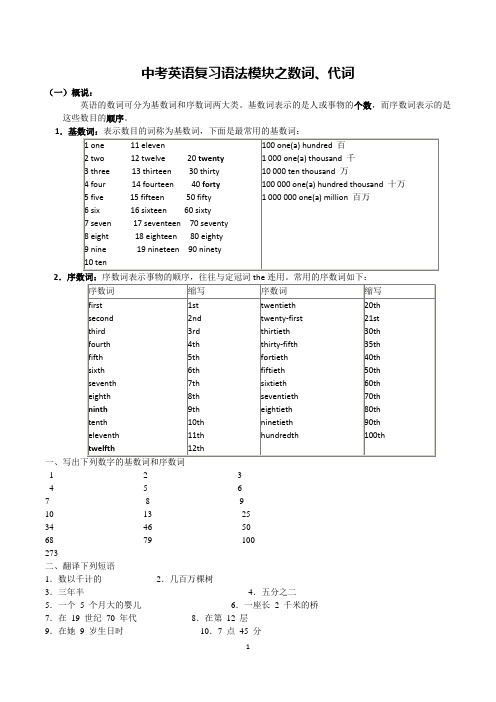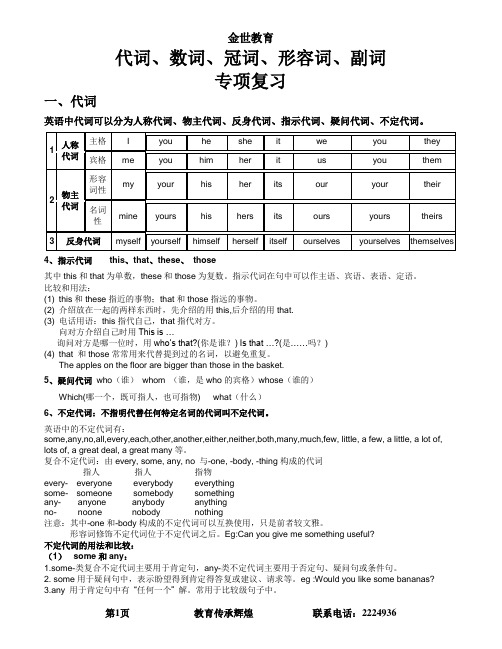代词与数词
英语语法--代词

英语语法——代词与数词代词一.概说定义:代词(pronoun)是代替名词的词:1.1代词在句子中的功用1)和名词一样,可作主语、宾语和表语。
b)有些代词和形容词一样,可作定语。
如:I am reading The Arabian Nights.我在读《天方夜谭》。
(作主语)This is John Smith speaking.(打电话用语)我是约翰•史密斯。
(作主语)Can I help you?我能帮你的忙吗?(作宾语)That's all.我的话完了。
(作表语)2)His father is an eye-doctor.他父亲是个眼科医生。
(作定语)All men are equal.所有的人都是平等的。
(作定语)3)格的变化有些代词有格的变化,如I 我(主格),me我(宾格),Who谁(主格),whom谁(宾格)。
某些代词有所有格,如whose谁的,other's别人的,somebody's某人的,one's一个人的。
4)单复数形式有些代词有单数和复数形式。
少数代词的复数形式和名词的复数形式的变化规则相同,如one-ones,other-others。
其他如人称代词、物主代词、自身代词和指示代词等,其复数形式与此不同,须个别记忆。
5)有或没有冠词代词之前一般不用冠词,只有少数例外。
如:the other,the others,a few,a little等。
种类1.2英语有下列几种代词:1)人称代词(personal pronoun)a)主格:I,he,she,it,we,you,they.b)宾格:me,him,her,it,us,you,them.2)物主代词(possessive pronoun):a)形容词性物主代词:my,his,her,its;our,your,their.b)名词性物主代词:mine,his,hers,its,ours,yours,theirs.3)自身代词(self-pronoun):myself,yourself,himself,herself,itself,ourselves,yourselves,themselves,oneself.4)相互代词(reciprocal pronoun):each other,one another.5)指示代词(demonstrative pronoun):this,that,these,those,such,same.6)疑问代词(interrogative pronoun):who,whom,whose,which,what.7)关系代词(relative pronoun):who,whom,whose,which,that.8)不定代词(indefinite pronoun):some,something,somebody,someone,any,anything,anybody,anyone,no,nothing,nobody,no one,every,everything,everybody,everyone,each,much,many,little,a little,few,a few,other,another,all,none,one,both,either,neither.二.人称代词概说表示"我',、"你"、"他"、"我们"、"你们"、"他们"等的词,叫做人称代词。
英语语法——代词与数词

英语语法——代词与数词代词一.概说定义:代词(pronoun)是代替名词的词:1.1代词在句子中的功用1)和名词一样,可作主语、宾语和表语。
b)有些代词和形容词一样,可作定语。
如:I am reading The Arabian Nights.我在读《天方夜谭》。
(作主语)This is John Smith speaking.(打电话用语)我是约翰•史密斯。
(作主语)Can I help you?我能帮你的忙吗?(作宾语)That's all.我的话完了。
(作表语)2)His father is an eye-doctor.他父亲是个眼科医生。
(作定语)All men are equal.所有的人都是平等的。
(作定语)3)格的变化有些代词有格的变化,如I 我(主格),me我(宾格),Who谁(主格),whom谁(宾格)。
某些代词有所有格,如whose谁的,other's别人的,somebody's某人的,one's一个人的。
4)单复数形式有些代词有单数和复数形式。
少数代词的复数形式和名词的复数形式的变化规则相同,如one-ones,other-others。
其他如人称代词、物主代词、自身代词和指示代词等,其复数形式与此不同,须个别记忆。
5)有或没有冠词代词之前一般不用冠词,只有少数例外。
如:the other,the others,a few,a little等。
种类1.2英语有下列几种代词:1)人称代词(personal pronoun)a)主格:I,he,she,it,we,you,they.b)宾格:me,him,her,it,us,you,them.2)物主代词(possessive pronoun):a)形容词性物主代词:my,his,her,its;our,your,their.b)名词性物主代词:mine,his,hers,its,ours,yours,theirs.3)自身代词(self-pronoun):myself,yourself,himself,herself,itself,ourselves,yourselves,themselves,oneself.4)相互代词(reciprocal pronoun):each other,one another.5)指示代词(demonstrative pronoun):this,that,these,those,such,same.6)疑问代词(interrogative pronoun):who,whom,whose,which,what.7)关系代词(relative pronoun):who,whom,whose,which,that.8)不定代词(indefinite pronoun):some,something,somebody,someone,any,anything,anybody,anyone,no,nothing,nobody,no one,every,everything,everybody,everyone,each,much,many,little,a little,few,a few,other,another,all,none,one,both,either,neither.二.人称代词概说表示"我',、"你"、"他"、"我们"、"你们"、"他们"等的词,叫做人称代词。
代词的人称与数量

代词的人称与数量代词是一类用来代替名词或名词短语的词语,在句子中起到替代作用。
代词可以根据其所代替的人称和数量来进行分析和分类。
本文将详细讨论代词的人称与数量,以帮助读者更好地理解和运用代词。
一、人称代词人称代词用来代替或指称特定的人、物或事物,根据其代替的人称可以分为一、二、三人称代词。
1. 一人称代词一人称代词用于指称说话者自己,常用的一人称代词有"I"(我)、"me"(我)和"my"(我的)。
例如:- I am a student.(我是一名学生。
)- This is my book.(这是我的书。
)2. 二人称代词二人称代词用于指称对话中的另一方,常用的二人称代词有"you"(你、你们)和"your"(你的、你们的)。
例如:- How are you?(你好吗?)- Is this your car?(这是你的车吗?)3. 三人称代词三人称代词用于指称谈话之外的人、物或事物,常用的三人称代词有"he"(他)、"she"(她)、"it"(它)和"they"(他们、她们、它们)。
例如:- He is my brother.(他是我的兄弟。
)- She has a beautiful dress.(她有一条漂亮的裙子。
)- It is a cat.(这是一只猫。
)- They are my friends.(他们是我的朋友。
)二、数量代词数量代词用来表示数量,可以是具体数目或泛指的数量。
根据其指代的数量范围不同,数量代词可以分为数词和不定代词两种。
1. 数词数词直接表示具体的数目,常见的数词包括"one"(一个),"two"(两个),"three"(三个)等。
数词,代词

中考英语复习语法模块之数词、代词(一)概说:英语的数词可分为基数词和序数词两大类。
基数词表示的是人或事物的个数,而序数词表示的是这些数目的顺序。
12一、写出下列数字的基数词和序数词1 _________ __________2 _________ __________3 _________ __________4 _________ __________5 _________ __________6 _________ __________7 _________ __________ 8 _________ __________ 9 _________ __________10 _________ __________ 13 _________ __________ 25 _________ __________34 _________ __________ 46 _________ __________ 50 _________ __________68 _________ __________ 79 _________ __________ 100 _________ __________273 _________ __________二、翻译下列短语1.数以千计的___________ 2.几百万棵树______________3.三年半_____________________________________ 4.五分之二________5.一个5 个月大的婴儿____________________ 6.一座长2 千米的桥______________________7.在19 世纪70 年代___________ 8.在第12 层_______________9.在她9 岁生日时________________ 10.7 点45 分___________________________基数词的用法1、表示计量:表示事物的计量,即事物的长度、宽度、深度和高度,应采用基数词。
英语词性词类详细讲解

2、 动词(verb)
(2)连系动词: be动词(is, am, are, was, were, have/has been) 感官系动词(feel,smell,taste,look,sound):后面一般加形容词 变化系动词(bee, get, grow, turn) :后面一般加形容词
①只做情态动词:
must, can (could), may (might), shall (should), will (would) ②可做情态动词又可做实义动词:
need, dare ③具有情态动词特征:
have (had, has) to, used to
大家有疑问的,可以询问和交流
可以互相讨论下,但要小声点
英语词性词类详细讲解
10种英语词类
6种英语实词(有实义):名词、动词、形容词、 副词、代词、数词
4种英语虚词:冠词、介词、连词和感叹词
6种英语实词
1、名词(noun,缩写式为n)
普通名词(mon noun): 就是某一类人、事物、某种物质或抽象概念得名称。 luggage, success, traffic 专有名词(proper noun):就是特定得某人、地方或机构得名称。专有名词 得第一个字母必须大写。 Tom, China, A Tale of Two Cities, March, Saturday
I was amazed at the variety of wonderful animals、
-ing 引发情感得事物或人:
It’s an absolutely amazing city to visit、
代词、数词、冠词、形容词、副词

代词、数词、冠词、形容词、副词专项复习一、代词英语中代词可以分为人称代词、物主代词、反身代词、指示代词、疑问代词、不定代词。
1 人称代词主格I you he she it we you they 宾格me you him her it us you them2 物主代词形容词性my your his her its our your their名词性mine yours his hers its ours yours theirs3 反身代词myself yourself himself herself itself ourselves yourselves themselves4、指示代词this、that、these、those其中this和that为单数,these和those为复数。
指示代词在句中可以作主语、宾语、表语、定语。
比较和用法:(1) this和these指近的事物;that和those指远的事物。
(2) 介绍放在一起的两样东西时,先介绍的用this,后介绍的用that.(3) 电话用语:this指代自己,that指代对方。
向对方介绍自己时用This is …询问对方是哪一位时,用who’s that?(你是谁?) Is that …?(是……吗?)(4) that 和those常常用来代替提到过的名词,以避免重复。
The apples on the floor are bigger than those in the basket.5、疑问代词who(谁)whom (谁,是who的宾格)whose(谁的)Which(哪一个,既可指人,也可指物) what(什么)6、不定代词:不指明代替任何特定名词的代词叫不定代词。
英语中的不定代词有:some,any,no,all,every,each,other,another,either,neither,both,many,much,few, little, a few, a little, a lot of, lots of, a great deal, a great many等。
代词、数词、形容词、副词

第三节代词代词是为了避免重复而用来代替名词的词。
英语代词共有9种:人称、物主、反身、相互、指示、疑问、关系、连接和不定代词。
大多数代词具有名词和形容词的作用。
人称代词人称代词有人称、性、数、格之分。
人称代词在句中的排列顺序一般是:you 在最前,I, we在最后,如:you, he and I。
人称代词的主格在句中作主语:They are playing football on the playground.人称代词的宾格在句中作动词或介词的宾语:Our En glish teacher taught us an En glish song. His parents are look ing for him.要注意人称代词it 的特殊用法:Look at that poor little child. It has just falle n dow n. It is n ecessary to buy that dict ion ary. I con sider it imp orta nt to ask him for advice. It is five o clock. It is fine today. It was a bicycle that Ireceived yesterday.物主代词表示所有关系的代词叫物主代词。
物主代词可分为形容词性(一般作定语)和名词性(作主语、表语、宾语)物主代词两大类。
物主代词的各种形式如下表:形容词性物主代词除作定语外,还可放在动名词短语之前,作短语的逻辑主语。
如: Do you mi nd my opening the door? His coming made us very happy. We can ' believe her break ing the law.反身代词表示“我自己”、“你自己”、“他自己”、“我们自己”、“你们自己”、“他们自己”的代词叫反身代词。
英语语法代词和数词

代词和数词(一)代词分类代词是代替名词的词,主要是为了避免名词的重复。
根据代词表达的意义和用法,代词可以分几类:人称代词:主格:I,you,he,she,it,they,we, 宾格:me,you,him,her,it,them,us 物主代词:形容词性:my,your,his ,her,its,our,their 名词性:mine,yours,his,hers,its,theirs,ours反身代词:myself(ourselves),himself,herself,itself(themselves),yourself(yourselves)指示代词:this,that,these,those...疑问代词:what,who,when...不定代词:some, something...关系代词:which,who,that...连接代词:which,who...(二)代词的用法1.不定代词的用法(1)few, a few, little, a littleFew, little 表示没有多少,含否定意义。
A few 和a little 表示有一些,含肯定意义。
另外,few,a few 可以修饰可数名词,little和a little修饰不可数名词。
(2)other 和anotherOther 泛指“另外的”作定语与复数名词或单数不可数名词连用,但前面有the,this ,that,some,any,each,no,none,one,or,every 以及形容词性物主代词是,可与单数名词连用,如:other boys, the other one,every other day等Others泛指“别的人或物”(但不是全部)如:Some are playing basketball,and others are playing football.The other 指“两者中的另一个”常与one 连用,表示另一方的“全部其余的”如:There are ten balls,two of them are red, the others are yellow.(the others 是the other 的复数形式)Another 指三个或三个以上中的“任何一个”,“再一”“另一个”。
- 1、下载文档前请自行甄别文档内容的完整性,平台不提供额外的编辑、内容补充、找答案等附加服务。
- 2、"仅部分预览"的文档,不可在线预览部分如存在完整性等问题,可反馈申请退款(可完整预览的文档不适用该条件!)。
- 3、如文档侵犯您的权益,请联系客服反馈,我们会尽快为您处理(人工客服工作时间:9:00-18:30)。
代词与数词代词代词的分类人称代词主格we I he she it they you宾格us me him her it them you物主代词形容词性our my his her its their your 名词性ours mine his hers its theirs yours指示代词This,that,those,such,same相互代词Each other,one another反身代词Oneself,himself,themselves,yourself,yourselves,herself,itself,myself 不定代词One,any,everyone,everything,anybody,anything,anyone,something,Somebody,all,both,each,either,neither,none,few,little,a few,A little,many,much疑问、关系代词Who,what,which,whose,whom1.物主代词形容词性物主代词作名词或动名词的定语。
还可与own连用,表示强调。
名词性物主代词作主语、宾语、表语。
还可与of连用,构成双重所有格,如a/an/this/that/these/those/some/any/several/no/each/every/such/another/which+名词+of+名词性物主代词。
2.指示代词指示代词在句中可作主语、宾语和定语。
另外,thi s和that在口语中也可以作为副词,作状语,相当于so,意为“如此,那么”如:Paul,the MP4 is very expensive.Can you afford this much?保罗,这个MP4很贵。
你付得起这么多钱吗?It isn't all that cold.Y ou don't need to bring too many clothes.天还没冷到那种程度。
你不必带太多衣服。
This(these)一般用来指后面要讲到的事物;that(those)常指前面讲过的事物。
如:Listen to this:a girl has died of bird flu.听听这件事:一个女孩的禽流感病死了。
He didn't come.That is why he didn't know.他没来,那就是为什么他不知道的原因。
Such与不定代词连用,其结构是:such+a/an+单数名词;such与不定代词连用,其结构是:one/no/any/few/every/some/many/all+名词。
如:Early in my life,I learned the truth of the old saying---there's no such thing as a free lunch.俗话说,世上没有免费的午餐。
很早我就懂的这句话的意思了。
Such is sure to be turned down.任何这类要求肯定会被拒绝。
3.反身代词反身代词在剧中可用作宾语、表语和同位语。
如:We all introduced ourselves before the meeting started.会议开始前我们都做了自我介绍。
Bob is not quite himself today.(be oneself 处于正常h 状态,显得自然)鲍勃今天感到不适。
反身代词用在一些固定习语中。
如:(1)与介词连用The computer can shut off of itself.电脑会自动关机。
He is not bad in himself,but he's so weak-minded.他本质不坏,只是很优柔寡断。
One would rather have a bedroom to oneself.人人都愿意有自己的卧室。
He was beside himself with joy when he heard he had passed exam.(因……而失去自制力)当他听说自己通过了考试时,他欣喜若狂。
Y ou can't go home by yourself in the dark.天黑以后你不能独自回家。
Y ou can try it out for yourself.你们自己可以试一试。
(2)与动词连用accustom oneself to sth. 习惯某事,适应某事;amuse oneself自我娱乐;apply oneself to sth/doing 专心做某事behave oneself 表现良好;devote oneself to sth 献身于某事;dress oneself给某人自己穿衣服;help oneself to sth擅自拿取;seat oneself(使自己)就座4.疑问代词(1)what与which的区别What sport do you like best?你最喜欢什么运动?(不限制范围)I'll have to get to Boston by 12 a.m. Which way is quicker ,by bus or by train?我12点之前必须赶到波士顿。
怎么去比较快,坐公共汽车还是坐火车?(限制范围)(2)whatever,whichever,whoever的用法whatever,whichever,whoever分别为what,which,who的强调式,相当于what/which/who on earth(in the world),意为“到底(究竟)什么/哪一个/谁”,用于表示惊讶和困惑。
如:Whatever do you mean by saying that at today's meeting?你在今天的会议上那么说究竟是什么意思?Whoever told you that I had changed my phone number?到底是谁告诉你我已经换了电话号码?5.不定代词的用法(1)both,all,either,any,neither,none的用法比较都任何都不两者both either neither三者或三者以上all any none-----What shall we meet again? 咱们什么时候可以再见面?----Make it any day you like ;it's all the same to me.你喜欢哪天就哪天,对我来说,哪天都一样。
----Can you come on Monday or Tuesday?周一周二你哪天能来?----I'm afraid neither day is possible. 我恐怕哪天都不能来。
(2)none,nothing,nobody(no one)的用法比较None既可以指人也可以指物,表特指概念(=not any of……),常回答how many,how much引导的疑问句;nothing只能指物,且表示泛指概念(=not anything),常回答what引导的疑问句;no one只能指人,且表示泛指概念,常回答who引导的疑问句-----How many people are there in the room?------None.-----Who is in the room?----No one.None后面可跟of短语,而no one /nothing 以及someone/anyone/everyone/something/anything/everything后面却不能跟of短语。
如:As we were asleep,none of us heard the sound.因为我们睡着了,所以没人听到那声音。
(3)every,each的用法比较Each强调“个体”,可作代词和形容词,指“两个或两个以上中的一个”;every强调“全体”,只能作定语,指“三个或三个以上”。
如:Each of my children goes to a different school.我们每个孩子各自在不同的学校上学。
Every student has to take the examination.=All students have to take the examination.每个学生都必须参加考试。
Each作同位语时,不影响谓语动词的形式,不可以not each表示部分否定;every可构成短语表示“每隔,每逢,每……”,不可用each。
如:We each have strong points as well as weak points,whether we are successful or not. When we lived in London,they would visit us every two weeks/every second week/every other week.(4)全部否定和部分否定表全部否定的不定代词的用法表部分否定的不定代词的用法No one ,none,nobody,nothing,not……any,no+名词Not与all,both,everyone,everybody,everything 等连用,无论not在句首还是在句中;not与总结性副词如everywhere,always,wholly,altogether连用(5)one,another,the other,some,others, the others一个/一些另外一个/一些剩余的一个/一些单数one other The other复数some others The othersI'm afraid I won't be able to come this afternoon.Would you please make it some otherday?(=another)恐怕今天下午我不能来。
改日好吗?(6)one,ones,the one,the ones,that,thoseOne用来代替前面出现的单数名词,时泛指概念,相当于a/an+单数名词;ones用来代替前面出现的复数名词,也是泛指概念;the one用来替代前面特指的单数名词,有时可用that替代(尤其在有后置定语的情况下);the ones用来替代前面特指的复数名词,有时可用those替代(尤其在有后置定语的情况下);that用来替代前面出现的特指的单数可数名词或特指情况下的不可数名词,相当于the+单数可数名词/不可数名词(7)不定代词的固定习语How did he dare to treat you like that?He is nothing but a clerk.他怎么敢那样对你?他只不过是个小职员Look at the way he spoke to the girl.He is anything but a clerk.看看他和那女孩说话的样子。
